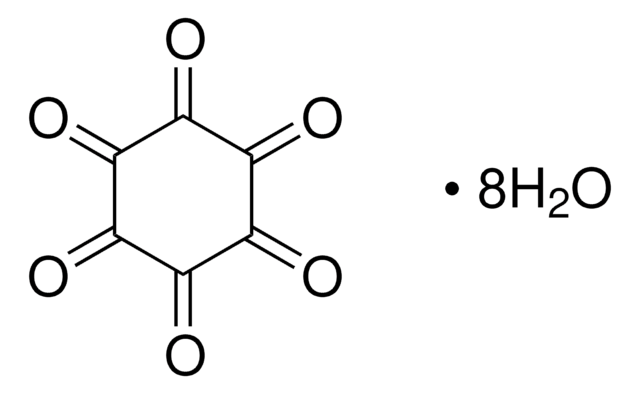792527
Imidazole
anhydrous, free-flowing, Redi-Dri™, ACS reagent, ≥99%
Synonym(s):
1,3-Diaza-2,4-cyclopentadiene, Glyoxaline
About This Item
Recommended Products
grade
ACS reagent
anhydrous
Quality Level
vapor pressure
<1 mmHg ( 20 °C)
product line
Redi-Dri™
assay
≥99%
form
solid
quality
free-flowing
impurities
≤0.2% water
ign. residue
≤0.1%
pH
9.5-11.0 (25 °C, 5% in H2O)
pKa (25 °C)
6.95
bp
256 °C (lit.)
mp
88-91 °C (lit.)
cation traces
Fe: ≤0.001%
SMILES string
c1c[nH]cn1
InChI
1S/C3H4N2/c1-2-5-3-4-1/h1-3H,(H,4,5)
InChI key
RAXXELZNTBOGNW-UHFFFAOYSA-N
Looking for similar products? Visit Product Comparison Guide
Application
Imidazole can be used as a catalyst in the following
- Silylation of alcohols, carboxylic acids, and amines in the presence of silyl chloride in DMF.
- To prepare acid chlorides from the corresponding carboxylic acids and phosgene.
- Imidazole-PPh3/I2 catalytic system used in the conversion of alcohols into iodides.
- Imidazole-PPh3/I2 is used in the diol deoxygenation reaction.
Legal Information
signalword
Danger
hcodes
Hazard Classifications
Acute Tox. 4 Oral - Eye Dam. 1 - Repr. 1B - Skin Corr. 1C
Storage Class
6.1C - Combustible acute toxic Cat.3 / toxic compounds or compounds which causing chronic effects
wgk_germany
WGK 2
flash_point_f
293.0 °F - closed cup
flash_point_c
145 °C - closed cup
Choose from one of the most recent versions:
Already Own This Product?
Find documentation for the products that you have recently purchased in the Document Library.
Customers Also Viewed
Articles
Redi-Dri™ prevents hygroscopic powders, such as inorganic salts, from absorbing moisture and forming clumps, leaving the salts free-flowing every time.
Our team of scientists has experience in all areas of research including Life Science, Material Science, Chemical Synthesis, Chromatography, Analytical and many others.
Contact Technical Service![Dipyrazino[2,3-f:2′,3′-h]quinoxaline-2,3,6,7,10,11-hexacarbonitrile 95% (HPLC)](/deepweb/assets/sigmaaldrich/product/structures/151/558/c0e2c95f-5228-4864-a7a5-4b9765a19840/640/c0e2c95f-5228-4864-a7a5-4b9765a19840.png)








